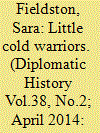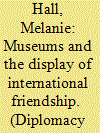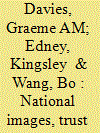|
|
|
Sort Order |
|
|
|
Items / Page
|
|
|
|
|
|
|
| Srl | Item |
| 1 |
ID:
174741


|
|
|
|
|
| Summary/Abstract |
This article considers the potential for the COVID-19 pandemic to represent an epochal moment in international politics, one which China can use as a window to maximize its international order-building efforts. It is argued that China’s putative international order-building efforts to date have faltered, in part, due to an inability to create meaningful friendships with prominent international powers. However, the COVID-19 pandemic allows China to play a key humanitarian role in heavily afflicted countries and, through this, perhaps an opportunity to forge more meaningful friendships. It is argued that China is trying to attach its concept of friendship to its humanitarian assistance while also stepping into the clear international leadership void that exists at the moment. This is not without faults or missteps, but the lasting impact could be significant for international politics and the global order.
|
|
|
|
|
|
|
|
|
|
|
|
|
|
|
|
| 2 |
ID:
101840


|
|
|
|
|
| Publication |
2011.
|
| Summary/Abstract |
The role of international friendship in regional integration - be it as one of encouraging integration or as its by-product - tends to be overshadowed by (realist) assumptions of naked self-interest. This article aims to open up a space for friendship in the study of regional integration, by exploring the structuration of a series of speech acts and institutional facts that can be interpreted as signs of engagement in, and proofs of, friendship. In doing this, it puts forward a new analytical perspective and methodological framework. The case studies chosen to illustrate the analysis - the Franco-German and the Argentine-Brazilian dyads - reflect the historical meaning of the experience of moving away from enmity/antagonism towards building relationships based on mutual trust, which put these dyads at the centre of regional integration processes.
|
|
|
|
|
|
|
|
|
|
|
|
|
|
|
|
| 3 |
ID:
132014


|
|
|
|
|
| Publication |
2014.
|
| Summary/Abstract |
During the two decades following World War II, American voluntary agencies including Christian Children's Fund, Foster Parents' Plan, and the Save the Children Federation ran child sponsorship programs that allowed American' foster parents' to send funds and exchange letters with youngsters in war-torn and poverty-stricken countries around the world. These programs were at once humanitarian gestures and political projects. American sponsorship agencies sought to forge international friendships that would support the United States' political alliances and mold children into strong democratic citizens who would join the fight against communism. Enlisting familial ideals in the service of U.S. foreign policy, American child sponsorship agencies rendered love itself a powerful Cold War weapon.
|
|
|
|
|
|
|
|
|
|
|
|
|
|
|
|
| 4 |
ID:
178361


|
|
|
|
|
| Summary/Abstract |
It is generally recognised that towards the end of the nineteenth century the Anglo-American relationship entered a new phase characterised by friendship-building initiatives. However, as American businesses sought to expand into the British Empire’s markets, that enterprise required trust more than friendship. This article captures an overlooked aspect of Ambassador Bayard’s cultural diplomacy, one that sought to build trust for American products and services by harnessing American philanthropy notably through his and other prominent Americans’ engagement with the Carlyle House Memorial Museum in the Empire’s capital. Simultaneously, Bayard’s engagement with the museum celebrated America’s endorsement of international copyright legislation. It argues that Thomas Carlyle’s views, together with his friendship with Ralph Waldo Emerson, made the museum-making initiative particularly suited to such purposes. At Carlyle’s House, a thriving group of American ex–patriots and tourists could associate the friendship of the two authors with ‘higher’ ideals of a ‘civilisation’ held in trust.
|
|
|
|
|
|
|
|
|
|
|
|
|
|
|
|
| 5 |
ID:
178125


|
|
|
|
|
| Summary/Abstract |
This article uses a new dataset of Chinese student attitudes to foreign affairs to analyse how perceptions of the United States, Russia, Japan and North and South Korea affect respondent perceptions of international friendship with these states. Employing a mediation analysis we find that perceptions of national trustworthiness above all other images is the crucial factor in explaining cross-national friendship. These findings suggest that trust-building measures would be a fruitful avenue for both reducing the likelihood of conflict in the region and fostering cooperative international interactions.
|
|
|
|
|
|
|
|
|
|
|
|
|
|
|
|
|
|
|
|
|